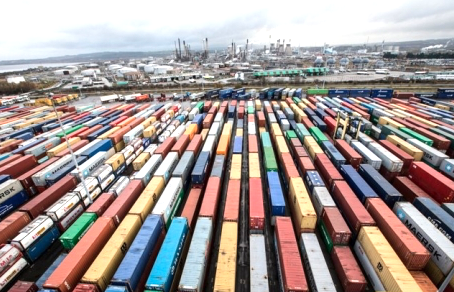Brexit has reduced goods exports from the UK by £27 billion, with smaller firms most affected, according to new research from the Centre for Economic Performance (CEP) at the London School of Economics and Political Science.
“The Trade and Cooperation Agreement (TCA) has reduced total goods exports from the UK by an estimated £27bn (or 6.4%) in 2022 – due to a 13.2% fall in the value of goods exported to the EU,” said the report.
The analysis, Deep Integration and Trade: UK Firms in the Wake of Brexit, published as a CEP discussion paper, uses data from more than 100,000 firms to estimate the gap between the actual value of exports under the TCA and what would have been expected had the UK remained in the EU.
It finds that 14% of firms — around 16,400 companies — that had previously exported to the EU stopped doing so after the TCA came into force in January 2021.
Most of the firms whose exporting business has suffered are smaller ones.
Among firms that continued exporting to the EU, the TCA reduced the average value of EU exports by 30% for the smallest fifth of firms — with six or fewer employees — and by 15% for the middle fifth (between 17 and 40 employees).
By contrast, exports by the top fifth of firms, those with more than 107 employees, were not affected by the TCA.
“The researchers find no evidence that the TCA has had either a positive or a negative effect on firms’ exports to countries outside the EU,” said the report.
“This means that the 6.4% reduction in overall exports is entirely due to lower exports to the EU.
“The TCA also reduced imports from the EU. But this decline was partially offset by higher imports from outside the EU.
“The researchers estimate that the TCA reduced total imports from all countries by 3.1%, which is equivalent to £20 billion lower imports in 2022.
“The research is the first to study the impact of Brexit on trade using customs records collected by HMRC.
“Using customs data to analyse trade at the firm-level generates new insights into the consequences of leaving the EU’s single market and customs union, and highlights how larger firms have adjusted to the new trade relationship better than small and medium sized firms.”
The report added: “The TCA did not include tariffs. But it did introduce barriers to trade such as customs checks and paperwork, rules of origin requirements, excise duties, sanitary and phytosanitary checks on the movement of animals and plants, and the need for exporters to prove their products comply with regulations in their destination market.”
Kalina Manova, co-author and professor of economics at UCL, said: “The TCA has disrupted firms’ relationships with firms they export to and import from. Firms’ performance in the medium to long run will hinge on their ability to maintain supply networks and diversify export demand in the face of higher and uncertain non-tariff barriers to EU trade.”
Thomas Sampson, co-author and associate professor of economics at LSE, said: “The TCA has been a disaster for small exporters, many of which have simply stopped exporting to the EU. At the same time, larger firms have adapted well to the new trade barriers. Consequently, total exports have, at least so far, declined less than expected.”
Thomas Prayer, co-author and associate of CEP’s trade programme, said: “After the referendum, there was essentially no change in firms’ trade with the EU until the TCA came into effect. It was the introduction of new trade barriers under the TCA, rather than the uncertainty of the withdrawal process, that reduced firms’ trade with the EU.”
